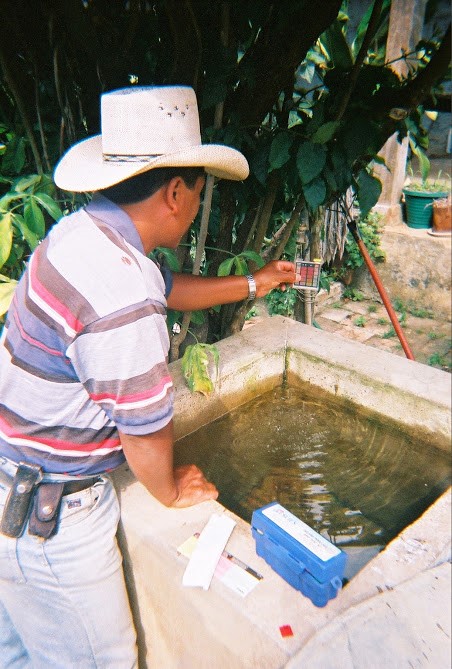 The World Chlorine Council has partnered with Andrew Robertson, P.E. of Water Engineers for the Americas to produce a set of three, easy-to-use cistern disinfection posters.
The World Chlorine Council has partnered with Andrew Robertson, P.E. of Water Engineers for the Americas to produce a set of three, easy-to-use cistern disinfection posters.
The posters provide simple, pictogram directions for cleaning and disinfecting cisterns, which are vats used to collect and store drinking water in remote areas and developing countries.
The three posters provide stepwise instructions for cleaning and disinfecting cisterns using sodium hypochlorite (bleach), calcium hypochlorite (“HTH”), and sodium dichloroisocyanurate (“NaDCC”), respectively.
Mr. Robertson, who volunteered his time to help develop the posters based on his extensive field experience, stated, “From hurricane relief to COVID, the need for emergency disinfection of household water supplies is now more acute than ever before. The instructional posters provided by the World Chlorine Council provide invaluable guidance to families in need, regardless of what language they speak”.
The posters may be downloaded for free here.
Photo courtesy of Andrew Robertson, P.E.
During these difficult times, chlorine chemistry has been called upon by authorities to help protect people and medical professionals around the world from the SARS-COV-2 ‘Coronavirus’.
The World Health Organisation has recommended using chlorine bleach to disinfect frequently touched surfaces. In addition, products made using chlorine chemistry (e.g. blood bags, medical tubing and face shields) are also helping in the fight against the virus.
To keep people and authorities informed, several useful information sources on COVID-19 are available from our members.
EUROPE – Cefic (European Chemical Association) has an informative map showing how Europe ensures that life-saving products get where they need to go;
INDIA – The Alkali Manufacturers Association of India is showing how chlorine chemistry can protect people from the virus;
NORTH AMERICA – The American Chemistry Council’s Coronavirus Resource Centre lists the efforts made by the US chemical industry to reduce the impact of COVID-19 – including donations of life-saving bleach;
The Chlorine Institute has resources to help keep producers safe and informed;
The Water Quality and Health Council has practical resources on how to safely use chlorine to disinfect homes and hospitals;
SOUTH AMERICA – Abiclor has pages dedicated to efforts in Brazil to use chlorine chemistry to control the virus.
More will be shared here from our members as they become available.
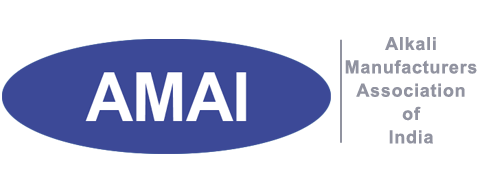 WCC Member, AMAI is running a series of training programmes on “Chlorine
Safety and Emergency Preparedness” for local water treatment facilities and municipalities
in various Indian states. This initiative aims to help raise awareness on the
benefits of chlorine, whilst demonstrating how chlorine can be safely handled,
used and what to do in an emergency.
WCC Member, AMAI is running a series of training programmes on “Chlorine
Safety and Emergency Preparedness” for local water treatment facilities and municipalities
in various Indian states. This initiative aims to help raise awareness on the
benefits of chlorine, whilst demonstrating how chlorine can be safely handled,
used and what to do in an emergency.
Ms. Harjeet Anand, AMAI Joint Director (Technical) noted that the programme includes classroom training sessions, demonstration of chlorine safety equipment and mock drills for the participants. This is followed by a site visit by AMAI Safety Experts to recommend improvements as necessary. This current project follows on from similar successful programmes on drinking water chlorination and chlorine safety in the Indian states of Maharashtra, Madhya Pradesh, Gujarat, Meghalaya, Telangana and Goa.
The project is also very timely as it follows from the recent World Water Day (22 March), where AMAI also had activities. Mr. Jayantibhai Patel, AMAI President, noted “We firmly believe the disease burden owing to water borne diseases can be significantly brought down through chlorine disinfection. This also ties in with achievement of [UN] Sustainable Development Goal 6: Water and Sanitation for All by 2030.”*
The safe use and handling of chlorine is particularly important at present as the Indian government is recommending chlorine products for the cleaning and disinfection of surfaces, disposal of used infected masks, for sanitation and hygiene in the control of the COVID-19 outbreak.
“AMAI members are making adequate availability of chlorine at all locations to meet the enhanced demand for drinking water disinfection and the Alkali industry is fully committed to supporting the government’s effort”, stated Mr. K. Srinivasan, Secretary General AMAI.
*Firstpost – 24 March 2020
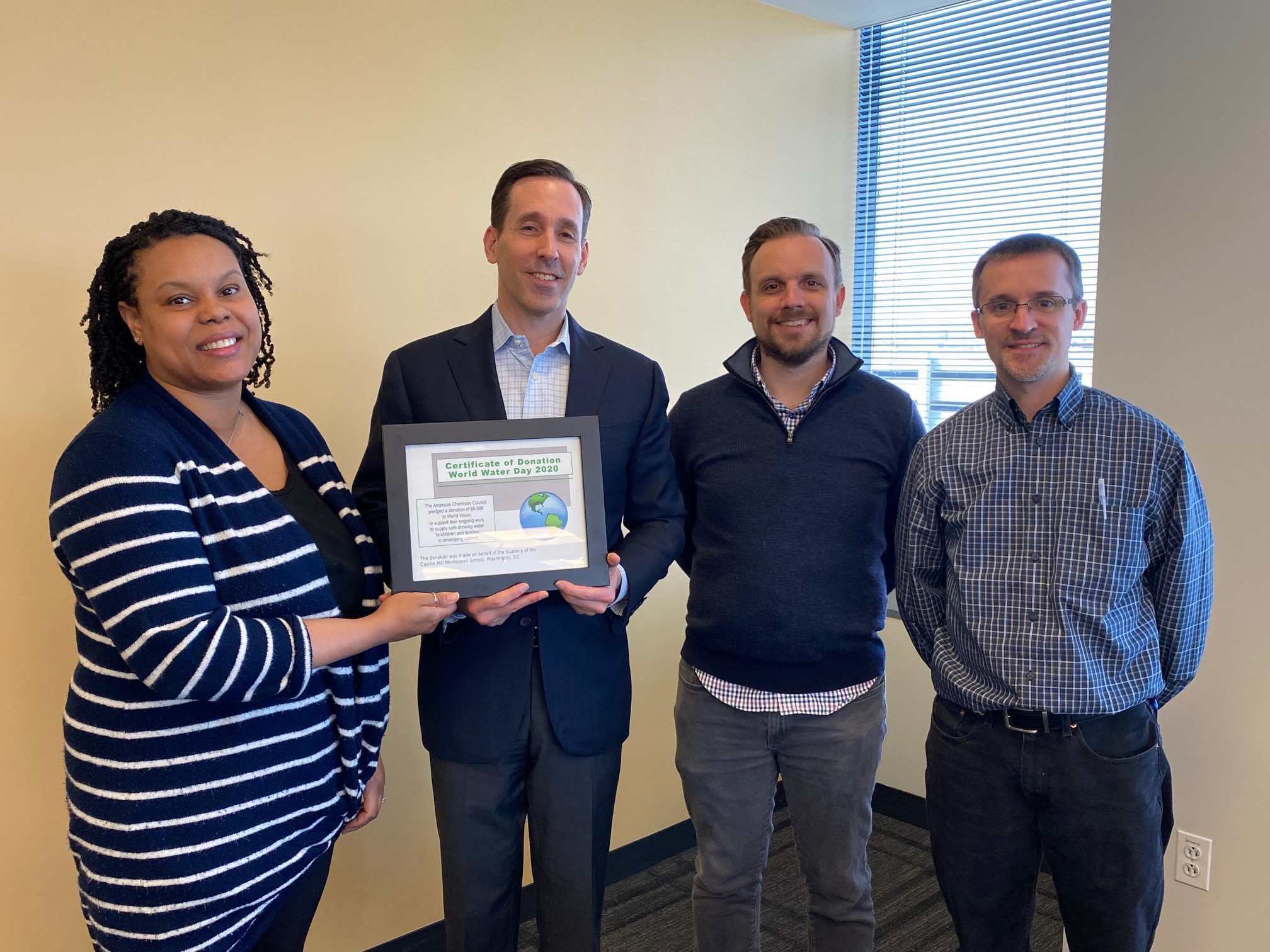 On 12 March 2020, WCC member ACC’s Chlorine Chemistry Division, welcomed 30 students, teachers, and adult volunteers from a nearby school for their annual World Water Day Celebration in the USA.
On 12 March 2020, WCC member ACC’s Chlorine Chemistry Division, welcomed 30 students, teachers, and adult volunteers from a nearby school for their annual World Water Day Celebration in the USA.
Held every year on 22 March since 1993, the United Nation’s (UN) World Water Day 2020 focuses attention on the global importance of safe water, which is closely tied to the UN Sustainable Development Goal 6 (SDG 6), “Ensure availability and sustainable management of water and sanitation for all” by 2030.
This year’s World Water Day aims to highlight the link between the impact on water from climate change and the need to use water resources more efficiently. Chlorine chemistry has an essential role in helping here.
The ACC event involved nine to ten year old students from the Capitol Hill Montessori School in Washington DC. Highlights included a presentation of ongoing efforts by World Vision to provide safe drinking water to developing nations around the world, including Ethiopia and Haiti; a student-led discussion of paintings they had made to celebrate World Water Day, and fun water quality and hand-washing experiments.
The day closed with a donation to World Vision from the Chlorine Chemistry Foundation made on behalf of the students by ACC President and CEO Chris Jahn.
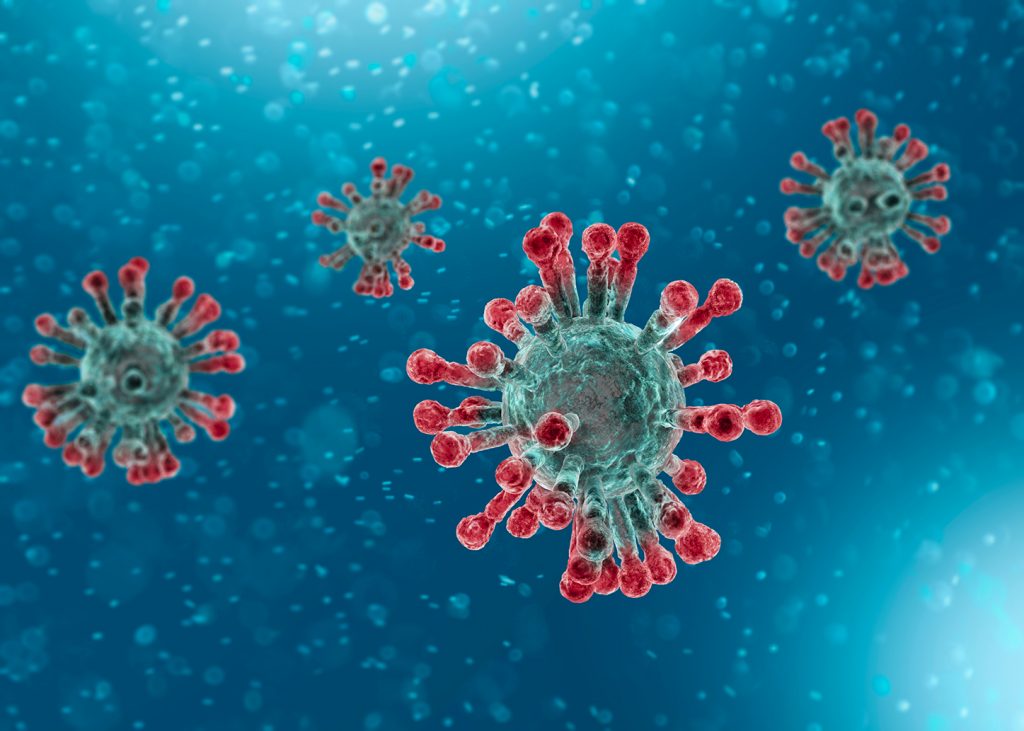 Chlorine chemistry is playing a vital role in controlling the outbreak of COVID-19 across the globe. The outbreak of Novel coronavirus, SARS-CoV-2, first identified in Wuhan, Hubei Province, China, has been declared a “public health emergency of international concern” by the World Health Organization (WHO). As of 03 February 2020, the WHO estimated that there were 17,238 confirmed cases in China with 361 deaths there and a further 153 confirmed cases in 23 other countries.
Chlorine chemistry is playing a vital role in controlling the outbreak of COVID-19 across the globe. The outbreak of Novel coronavirus, SARS-CoV-2, first identified in Wuhan, Hubei Province, China, has been declared a “public health emergency of international concern” by the World Health Organization (WHO). As of 03 February 2020, the WHO estimated that there were 17,238 confirmed cases in China with 361 deaths there and a further 153 confirmed cases in 23 other countries.
The US Centre for Disease Control, CDC, has issued advice to prevent the spread of the virus whose symptoms include fever, coughing and shortness of breath.
Many public health authorities, such as the one in Belgium, are recommending cleaning all high-touch surfaces, bathrooms and toilets every day, using “a diluted bleach solution or a household disinfectant of 1-part bleach to 99-parts water”.
In addition, chlor-alkali producers from around the world are sending items made using chlorine chemistry to help in the fight against the virus. Medical equipment such as polycarbonate face shields and sterile PVC tubing are protecting emergency personnel and helping people to recover from the virus.
Unfortunately, there are also social media reports suggesting that people drink bleach or chlorine dioxide solutions to ‘cure’ COVID-19. Medical experts from around the world and representatives of the US Food and Drug Administration strongly advise against consuming these chemicals as a treatment or preventative measure to combat COVID-19.
In 2019, the number of cases of the tropical disease known as Dengue fever increased by almost 600% in Brazil. This potentially life-threatening illness can be spread by the Aedes aegypti mosquito, whose larvae thrive in stagnant, untreated water.
Fortunately, chlorine chemistry can help prevent the spread of these insects. Sodium hypochlorite (or bleach) is very effective in fighting the larvae of Aedes aegypti. This vital chemical is also useful against mosquito that spread the chikungunya and zika diseases and prevent mosquito from spreading.
As such, WCC member Abiclor, the Brazilian chlor-alkali and Derivatives Industry Association, is launching a new campaign to focus on Dengue fever caused by the Aedes aegypti mosquito and the role chlorine chemistry plays in this fight. To start this project, they have published a video in Portuguese that shows how plants can be cared for to stop them from being a breeding ground for mosquitos. Three other videos will appear soon that will focus on pools, water tanks, drains and toilets which, if untreated, can also be potential homes for mosquito to grow in.
This is the fourth year of work by Abiclor, who have an informative leaflet on the important topic. There are plans to extend the project into other parts of Latin America and the Caribbean. Mexico, Nicaragua, Colombia and Honduras all have many cases of Dengue fever from mosquito according to the Pan American Health Organisation. Higher temperatures and increases in heavy rains recorded in the region have led to the faster spread of mosquito in Latin America.
This work is very timely as by October 2019 more than 2.7 million cases of dengue had been reported in the region with over 1200 deaths. This is 13% higher than in 2015, when the last outbreak of dengue occurred. Chlor-alkali chemistry plays a vital role in the fight against mosquito-borne diseases
The UN General Assembly and UNESCO declared 2019 as the International Year of the Periodic Table (IYPT) of the Elements to honour the 150th anniversary of Russian Scientist Dmitry Mendeleyev’s discovery of his famous Periodic Law. WCC regional association RusChlor and its full members participated actively in all the Russian events held. In addition, RusChlor members held scientific workshops and exhibitions at their facilities in honour of this anniversary, which even involved manufacturing and distributing special free souvenirs to participants.
Dmitry Mendeleyev was born on 8 February 1834 in Tobolsk and died on 2 February 1907 in St. Petersburg, Russia. He was the embodiment of a Russian polymath (i.e. a scientist with encyclopedic knowledge) as he successfully produced some fundamental research works in the fields of chemistry, physics, metrology, meteorology, economy, aerostatics, agriculture, chemical technologies, public education in addition to numerous other works linked to the industrial development of Russia. He worked as Professor at St. Petersburg University, as well as Associate Fellow at the St. Petersburg Academy of Sciences. The famous Periodic Law features among his best known discoveries as a fundamental law governing the whole universe. Mendeleyev is also the author of the classic textbook entitled “The Essentials of Chemistry”.
The Periodic Law opened up a new era in the development of all the natural sciences. If the Law had not existed, then it would not have led to today’s interest in chemistry, physics, biology, and the other natural sciences, including the newest chemical products and technologies. The Academy of Sciences of the Russian Federation (RAN), Russian Dmitriy Mendeleev Chemistry Society, Russian and foreign scientists started a discussion on the feasibility of staging all the events considered relevant under the IYPT. The initiative then was upheld at UN level by a few countries worldwide, approximately 80 National Academies of Science and Scientific Societies, and some influential international NGOs including the International Union of Pure and Applied Chemistry (IUPAC) and the International Union of Pure and Applied Physics (IUPAP). The Opening Ceremony was officially staged at the Paris UNESCO headquarters on 29 January 2019.
The Presidium of the Academy of Sciences of the Russian Federation (RAS) then held an Inaugural Session on 6 February 2019 for IYPT on Russian soil. This day was chosen to celebrate both the Russian Science Day and Dmitriy Mendeleev’s birthday. In so doing, the Organising Committee cooperated with the heads of the various Federal Government’s Bodies, Agencies, and Departments as well as the leaders of the most prominent Scientific Research Institutes.

Closing Ceremony for the IYPT held on the premises of the Central Library of Moscow State University.
On 5-7 February 2019, the RAS also held an international exhibition aimed at featuring the history of both the chemical elements and chemistry itself, which has since travelled all over the world under the aegis of UNESCO. Works by Russian, British, French, Chinese, Japanese, and American Scientists were represented at the exhibition. Visitors were shown various artistic installations devoted to the Periodic Table and performed techniques ranging from macramé to the computer games. More than 500 scientific and educational events have been held this year in conjunction with the Mendeleev’s Table of Elements in the Russian Federation since the beginning of this year, including the All-Russia Festival “NAUKA 0+” and the All-Russia Forum of the Teachers of Chemistry. But the pivotal of all these events was the Mendeleyev 21st Convention on the General and Applied Chemistry held in St. Petersburg on 9-13 September 2019 with presentations from more than 2000 representatives of the Scientific Society from both Russia and abroad, including two Nobel Prize winners. IYPT-related events have occurred in almost every country in the world in addition to Russia, including the United States, Germany, Spain, Japan.
IYPT was ceremonially closed twice. Firstly unofficially at the Ceremonial Meeting held on the premises of the Central Library of Moscow State University on 28 November and secondly with the official ceremony held in Tokyo, Japan on 5 December 2019. Although these special activities have taken place this year, the work to widen the contact between scientists from all over the world, heightening the role of science and facilitating the support of scientific research all over the world needs to be continued indefinitely.
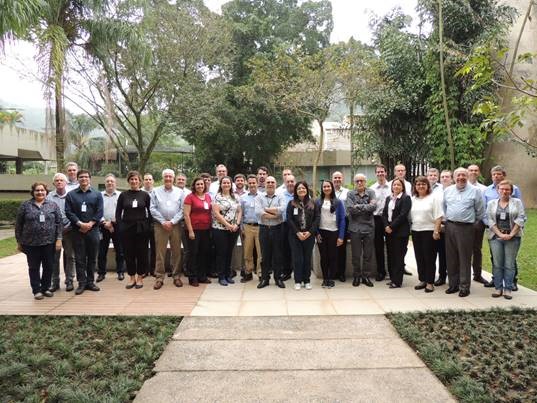 The Latin American Chlor-Alkali and Derivatives Industry Association (CLOROSUR) held a special meeting on the Minamata Convention on Mercury from 18-19 September 2019, which discussed among other topics the Brazilian Ministry of Environment (MMA) and the Brazilian Chlor-Alkali and Derivatives Industry Association (ABICLOR) strategy for the implementation of the Convention. The meeting, attended by 40 representatives of all producer members of the region, the Brazilian Ministry of Environment, financial institutions and others covered the Brazilian phase-out plan and technology conversion, plans for decommissioning, financing alternatives and the project information form for UNIDO to apply for a GEF fund (with ABICLOR as the co-executor). This is pending approval from GEF.
The Latin American Chlor-Alkali and Derivatives Industry Association (CLOROSUR) held a special meeting on the Minamata Convention on Mercury from 18-19 September 2019, which discussed among other topics the Brazilian Ministry of Environment (MMA) and the Brazilian Chlor-Alkali and Derivatives Industry Association (ABICLOR) strategy for the implementation of the Convention. The meeting, attended by 40 representatives of all producer members of the region, the Brazilian Ministry of Environment, financial institutions and others covered the Brazilian phase-out plan and technology conversion, plans for decommissioning, financing alternatives and the project information form for UNIDO to apply for a GEF fund (with ABICLOR as the co-executor). This is pending approval from GEF.
The meeting was held at one of the sites of a company that had already been through the conversion from mercury to membrane, so they also shared their lessons learnt. Each company presented the status of their plans to phase out or convert technologies. Other discussions were held on the best place to store metallic mercury before stabilisation and final safe disposal, residues, waste management, etc. Some companies who provide services to stabilise mercury were there from Germany and Switzerland.
Feedback from MMA, UNIDO and others were very positive, who said it was a pioneering event as all the stakeholders were there.
All this information was subsequently shared at the preparatory GRULAC meeting (The Group of Latin America and Caribbean Countries) on 29-30 October 2019, in São Paulo, Brazil, to examine the topics to be addressed at the COP 3 Minamata Convention, in Geneva, on 25-29 November 2019.
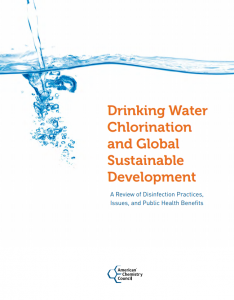 The American Chemistry Council’s Chlorine Chemistry Division (ACC CCD) has completed a new booklet entitled “Drinking Water Chlorination and Global Sustainable Development.” The booklet reviews the disinfection practices, issues, and public health benefits of drinking water chlorination in the context of the UN Sustainable Development Goals (SDGs), particularly in relation to SDG 6, Clean Water and Sanitation.
The American Chemistry Council’s Chlorine Chemistry Division (ACC CCD) has completed a new booklet entitled “Drinking Water Chlorination and Global Sustainable Development.” The booklet reviews the disinfection practices, issues, and public health benefits of drinking water chlorination in the context of the UN Sustainable Development Goals (SDGs), particularly in relation to SDG 6, Clean Water and Sanitation.
Specifically, the 32-page booklet details chlorine’s role in public health, water treatment fundamentals, risks and types of waterborne diseases, disinfection byproducts, water treatment facility security, disinfection methods, and the future of chlorine disinfection. It also reviews U.S. drinking water regulations, waterborne disease trends, and includes illustrative case studies of waterborne disease outbreaks to help prevent future incidents.
Safe drinking water is key to achieving the SDGs. Beyond it contributing directly to SDG 6, clean drinking water helps achieve other SDGs, such as gender equality (SDG 5) by reducing the burden on women and girls to fetch water, and good health and well-being (SDG 3) by reducing communicable diseases. The information in this booklet will help readers better understand the importance and challenges of providing safe drinking water, and its critical role in sustainable development.
In addition to the English version, the booklet has been translated into Mandarin to extend the reach of this important information.
 The World Chlorine Council (WCC) is pleased to highlight the effective use of chlorine chemistry to help preserve aquatic ecosystems around the world through ballast water treatment. Ballast water is the water taken into and discharged from ship ballast tanks to improve the vessel’s stability, buoyancy and maneuverability. Unfortunately, ballast water taken into a ship in one ecosystem that is later discharged into another ecosystem, can result in the spread of aquatic invasive species.
The World Chlorine Council (WCC) is pleased to highlight the effective use of chlorine chemistry to help preserve aquatic ecosystems around the world through ballast water treatment. Ballast water is the water taken into and discharged from ship ballast tanks to improve the vessel’s stability, buoyancy and maneuverability. Unfortunately, ballast water taken into a ship in one ecosystem that is later discharged into another ecosystem, can result in the spread of aquatic invasive species.
A case in point is the zebra mussel, which is indigenous to Russian and Ukrainian lakes and rivers, but now thrives in non-native freshwater environments worldwide. Zebra mussels clog water intakes, and displace native mussels, among other detrimental effects.
Under the International Maritime Organization’s Ballast Water Management Convention, ships of nations that are parties to the convention will be required to treat their ballast water before discharging it to receiving waters, to help protect aquatic ecosystems globally. This will help achieve the UN Sustainable Development Goal #14, which focuses on preserving life below water. Available ballast water treatment technologies include chlorine-based methods that employ hypochlorites or chlorine dioxide to destroy “stowaway” organisms in ballast water tanks. WCC’s new issue brief on this topic can be found here.